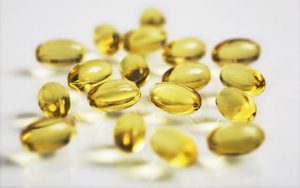Fish and borage oils all contain essential fatty acids, or EFAs, but they are not created equal and differ in their health benefits. Fish oil is rich in omega-3 fatty acids, whereas borage oil is rich in omega-6 fatty acids.
Contents
Uses
The EPA and DHA found in fish oil are readily available to your body to utilize. These constituents of omega-3 help decrease inflammation and pain in conditions like rheumatoid arthritis and dysmenorrhea, or painful periods, and are known to improve cardiovascular health and reduce cholesterol levels.
Borage oil is one of the most abundant sources of gamma linolenic acid, or GLA, an omega-6 fatty acid mostly found in plant-based oils. Although most Americans obtain an excess of linoleic acid through diet, it’s often not converted to GLA due to diets rich in sugar, alcohol or trans fats from processed foods, as well as smoking, pollution, stress, aging, viral infections, and other conditions such as diabetes. This is a reason to supplement with borage oil, or GLA, as it may help improve diabetic neuropathy, rheumatoid arthritis, osteoporosis, premenstrual syndrome, eczema, and aid in cancer treatment, according to the University of Maryland Medical Center based on several clinical studies.
Benefits
Borage seed oil is used for skin disorders including eczema, seborrheic dermatitis, and neurodermatitis. It is also used for rheumatoid arthritis (RA), stress, premenstrual syndrome (PMS), diabetes, attention deficit-hyperactivity disorder (ADHD), acute respiratory distress syndrome (ARDS), alcoholism, pain and swelling (inflammation), and for preventing heart disease and stroke.
Borage flower and leaves are used for fever, cough, and depression.
Borage is also used for a hormone problem called adrenal insufficiency, for “blood purification,” to increase urine flow, to prevent inflammation of the lungs, as a sedative, and to promote sweating. Borage is also used to increase breast milk production and to treat bronchitis and colds.
Borage is applied to the skin for infantile seborrheic dermatitis and is also used in a dressing to soften the skin.
In foods, borage is eaten in salads and soups.
In manufacturing, borage is used in skin care products.
Cautions
Borage seed oil is POSSIBLY SAFE when taken by mouth or applied to the skin appropriately.
Borage seed oil is LIKELY UNSAFE when products containing a dangerous chemicals called pyrrolizidine alkaloids (PAs) are taken by mouth. Borage plant parts including the leaf, flower, and seed can contain PAs. PAs can damage the liver or cause cancer, especially when used in high doses or for a long time. Only use products that are certified and labeled PA-free.
Special Precautions & Warnings:
Children: Borage see oil is POSSIBLY SAFE when taken by mouth appropriately. Borage seed oil is LIKELY UNSAFE when products containing PA are taken by mouth.
Pregnancy and breast-feeding: Borage seed oil is LIKELY UNSAFE during pregnancy and while breast-feeding. It is important to avoid borage products that might contain pyrrolizidine alkaloids (PAs). PAs are a risk to the mother because they can cause serious liver disease and might cause cancer. PAs are also a risk to the infant because they might cause birth defects and they can pass into breast milk. Researchers are not sure if borage products that are certified PA-free are safe during pregnancy and breast-feeding. It is best to stay safe and avoid using borage.
Bleeding disorders: There is some concern that borage seed oil might prolong bleeding time and increase the risk of bruising and bleeding. If you have a bleeding disorder, use borage with caution.
Liver disease: Borage products containing hepatotoxic pyrrolizidine alkaloids (PA) might make liver disease worse.
Surgery: Borage might increase the risk of bleeding during and after surgery. Stop taking borage at least 2 weeks before a scheduled surgery.
Interactions
None interactions are recorded.
Other names
Borage oil: Bee Plant, Beebread, Borage Flower, Borage Leaf, Borage Seed Oil, Borago, Borago officinalis, Borraja, Bourrache, Bourrache Commune, Burage, Burrage, Common Borage, Common Bugloss, Cool Tankard, Feuille de Bourrache, Fleur de Bourrache, Huile de Bourrache, Huile de Graines de Bourrache, Langue de Bœuf, Ox’s Tongue, Pain-des-Abeilles, Talewort, Starflower, Starflower Oil.
References
Source: WebMD, http://www.webmd.com/vitamins-supplements/ingredientmono-596-borage.aspx?activeingredientid=596&activeingredientname=borage
Nutraingredients, http://www.nutraingredients.com/Research/Flax-and-borage-oil-may-boost-skin-health-from-within
LiveStrong, http://www.livestrong.com/article/390391-fish-flax-and-borage-oils/

